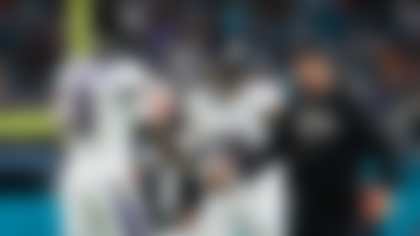The New York Jets came out running all over the New England Patriots on a spirited opening-drive touchdown march. The running and the spirit quickly withered in an eventual 27-14 loss.
On the 14-play, 72-yard touchdown drive to open the prime-time tilt, Justin Fields rushed the ball five times for 28 yards and threw just twice, capping the possession with a 5-yard touchdown run. From there, the QB run plays dissipated. He rushed the ball six times the rest of the game for 39 yards. On the night, he completed 15 of 26 passes for 116 yards with one touchdown.
The Jets' shift in gears after the first series was stark. Fields didn't run the ball on the following three drives. Gang Green went three-and-out each time, allowing the Patriots to wrestle control of the game.
Jets coach Aaron Glenn defended the play-calling, saying they don't want to run Fields into the ground.
"Well, the thing is we don't want to make it a habit of our quarterback just continuing to run because we can put him in harm's way," he said, via the team's official transcript. "I felt like if we get a fast start, we'll be in a good position. And Justin ran the ball quite a bit. The thing is, we, man, can't put Justin in a situation where that's a running back, and I think we all know that because we will put him in harm's way. You're right, he did a good job on some of those runs. We just have to be calculated when we do those things."
Fields, who completed below 60 percent of his passes for the fifth time in nine games, said he doesn't mind an uptick in QB runs, if that's what is asked.
"Whatever I have to do to get this team as successful as can be and for us to reach our highest potential, I'm willing to do whatever," he said. "So if that's me running the ball, that's what it is."
Glenn is right not to want to grind Fields into a pulp. The QB's own injury history in Chicago underscores the danger of repeated hits. As New York's other team saw with Jaxson Dart, eventually, the hits will lead to injury.
Perhaps it's admirable for Glenn to not continually insist that offensive coordinator Tanner Engstrand put Fields in harm's way, when running the ball is clearly his best attribute. If nothing else, this season underscored that Fields is not the long-term answer under center. The coaching staff, under fire from the media and fans, could deploy a military academy-style offense that would get Fields hit often. Instead, we watch a square-peg-round-hole attack.
Fields' inefficient passing operation hasn't improved much in his five NFL seasons. There might be flashes, but it always reverts to panicked feet and slow processing when he's forced to sit in the pocket.
Glenn highlighted some of the good throws that Fields made that weren't caught -- new wideout Adonai Mitchell particularly struggled with drops.
"I thought he put some balls out there," Glenn said. "We got to have some guys that make some plays for him, too. I know for a fact he's going to say there are some things he can do better. We have to watch the tape, but I thought there were some good things he did out there."
Those things weren't enough to keep winning alive.
With Drake Maye on the opposite side, lighting up Glenn's defense with deft pocket movements and accurate darts, the dichotomy between the QBs couldn't be any more stark. The Jets will continue to search for their own Drake Maye next offseason. Until then, Glenn doesn't sound like he's willing to run his QB, even if that's what he does best.












